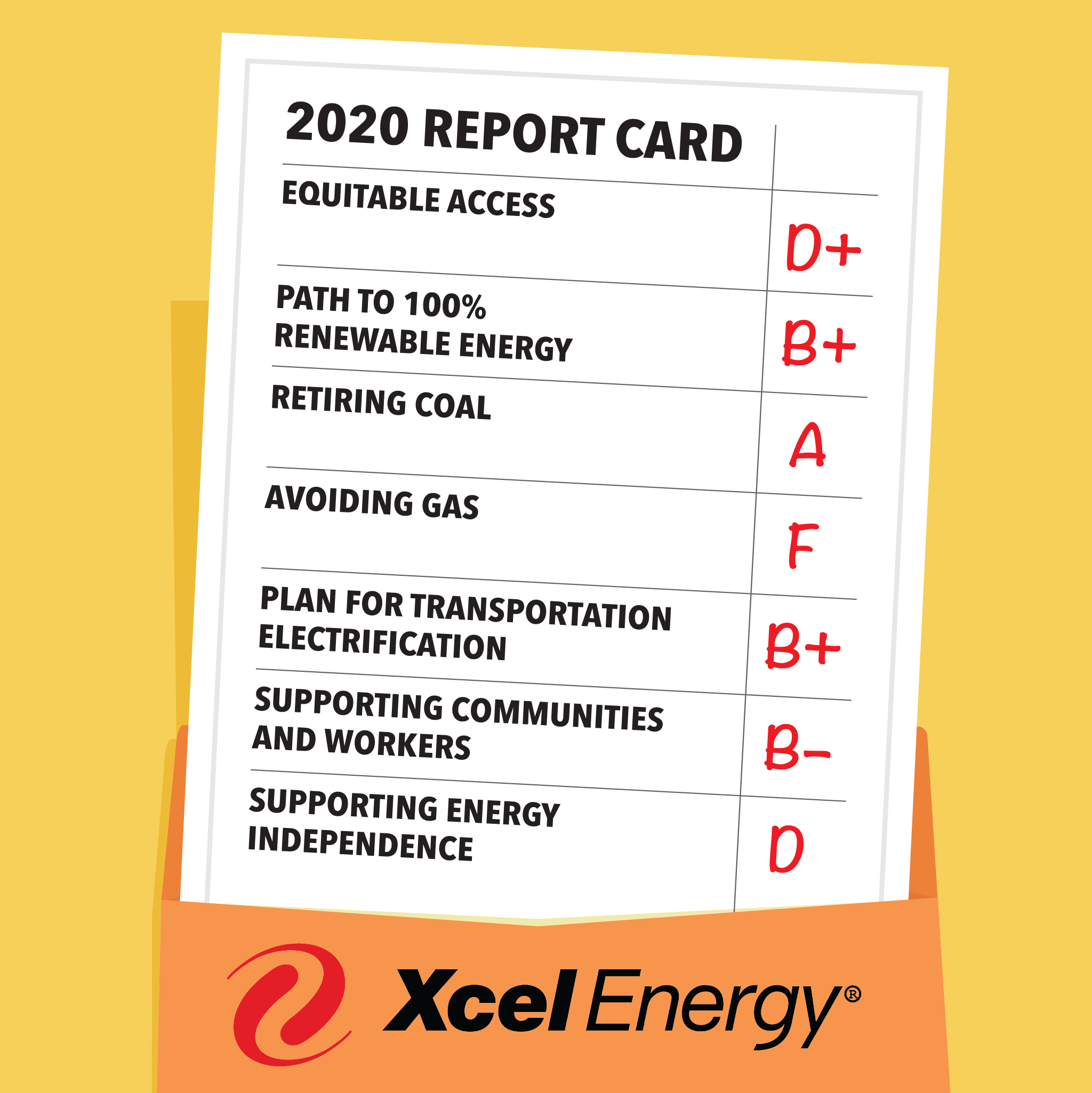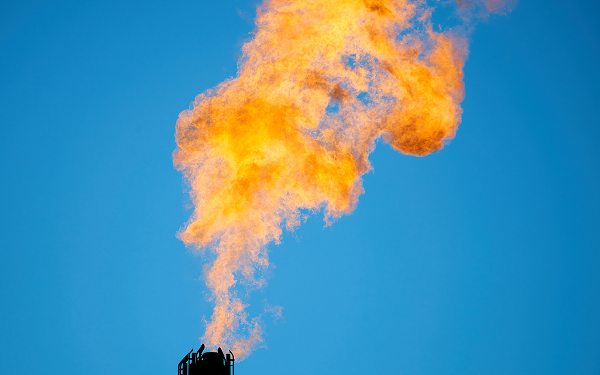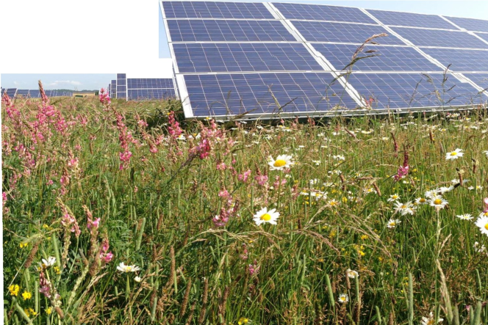Despite big 100% carbon-free goals, Xcel’s plan still goes big on fossil gas and doesn’t go far enough to address racial and economic justice. We deserve better.
Minnesotans -- Black and white, urban and rural -- want to protect our children’s and our climate’s future. Unfortunately, while Xcel Energy, a major energy provider and fossil fuel polluter in MN, has made steps in the right direction, the company isn’t there yet. We need a bold plan that gets us to 100% clean & equitable energy. There are just too many places where Xcel Energy isn’t making the grade.

Join us in calling on Xcel Energy and the MN PUC to stop building new fossil gas plants and pipelines and use its investments in clean energy to support a more equitable energy system that benefits those most hurt by our current system. Send a comment to the MN Public Utilities Commission on Xcel Energy’s plan, and encourage them to hold Xcel accountable.
Together, we can create a future for Minnesota that is fair, equitable, and powered by 100% clean, renewable energy.
Background
Last year, Xcel Energy filed its IRP, or Integrated Resource Plan, a 15-year long-term energy plan that outlines how Xcel will provide its ratepayers with safe, reliable, and affordable electricity. The IRP was a mixed bag, with exciting commitments to retiring Xcel’s remaining Minnesota coal plants by 2030 and dramatically expanding solar energy and energy efficiency (thanks to years of customers demanding this!), but also with plans to build a new dirty and dangerous fracked gas plant and pipeline in Becker and discount the opportunities for community and consumer owned solar. Ultimately, we said that “less dirty than coal” is still too dirty, and we joined with partner organizations to issue a report card breaking down where Xcel Energy was making the grade, and where there was still work to do.
The Minnesota Public Utilities Commission--the MN PUC, the regulatory body that oversees Minnesota utilities--found some problems with Xcel’s IRP, and asked the utility to redo their analysis. Xcel recently filed a supplement to its plan, so we updated our report card, too. Visit https://letsleadagainmn.org/ to take a look. Unfortunately, Xcel’s plan (and the grades we gave) haven’t changed much in the last year.
(For more information on IRPs and why they matter, as well as what the Sierra Club was asking for in Xcel’s IRP, check out our May, 2019 blog post)
Meanwhile, the world has changed.
While Xcel Energy’s IRP has not changed much since 2019, the world has changed quite a bit over the past year. The climate crisis has only gained in urgency as fires swept Australia in early 2020 and now are choking the Western United States, farmers across the globe adjust to changing conditions, ice caps continuing to melt at a record pace, and storms and hurricanes are becoming more severe. The impacts of the climate crisis are disproportionately felt by BIPOC (Black and Indiginous People of Color) and those living in poverty around the globe.
We are also in the midst of a global COVID-19 pandemic that has broadened awareness of the vast racial and economic disparities in the US, with BIPOC communities more likely to contract and die from COVID-19 and disproportionately impacted by the economic crisis that has followed. Even before the coronavirus pandemic, nearly one-third of households in the US were struggling to pay their electric bills. Black Americans were particularly hard-hit, with many paying more for energy than white households, and half of Black workers in Minnesota losing work during this pandemic.
And we are in the midst of a global uprising for Black Lives after the murder of George Floyd by Minneapolis Police Officers, with calls to dismantle the racist institutions that lead Minnesota to have some of the worst racial disparities in the nation.
At the same time, in the second quarter of 2020 - in the middle of the COVID-19 crisis when most of us are scrambling to figure out to pay our bills - Xcel earned a profit of 287 million dollars, 20.5% higher than the same time last year. In 2019, Xcel earned almost 1.4 billion dollars and gave CEO Ben Fowke total compensation worth 17 million dollars. And they had a negative income tax rate, which means they paid no taxes.
Climate, racial and economic justice are all connected. We can’t have climate justice without dismantling white supremacy. And while utility resource plans are not the only solution to these big problems, utilities have been granted the right to be monopolies under a mandate to serve the public interest, and therefore have a responsibility to address these issues where they can.
Xcel Energy’s integrated resource plan must outline a path to eliminate greenhouse gas emissions and other air and water pollution while building a clean energy economy that helps address our state’s deep inequities. The scale of the transformation necessary to address the climate crisis means there are also significant job and investment opportunities -- and Xcel and the Commission have a role to play in ensuring that jobs and investments occur in communities that have been disproportionately harmed by the pollution and costs resulting from past decisions.
OK. Now back to the Xcel IRP. How does their updated plan measure up?
For a full breakdown of Xcel’s IRP, where it succeeds, and where it falls short, visit https://letsleadagainmn.org/. Here five big takeaways:
-
Xcel’s proposal to build a new fracked gas plant and pipeline is risky for the climate and customers.
The science is clear: we can’t address the climate crisis by building new fossil fuel plants. The Sherco plant would emit an estimated 3 million tons of carbon each year, including the emissions from burning gas at the plant and the upstream emissions from fracking and transporting the gas. These plants are also economically risky because customers may be stuck paying off the plants for decades, long after we stop burning fossil fuels in favor of clean energy. We found that building Xcel’s proposed $1 billion gas plant will leave customers on the hook for hundreds of millions in stranded costs. These climate and economic risks will be disproportionately felt by BIPOC (Black, Indigenous, and People of Color). Xcel needs to commit to its goal of 100% carbon-free energy and stop plans to build this gas plant and pipeline.

-
Community and consumer owned solar are a critical missing piece to Xcel’s plan.
Solar on people’s homes and businesses and in their local communities provides electricity where it is needed, can cut electricity costs for customers, and reduces the need to burn fossil fuels. Minnesota’s community solar program gives Xcel customers the opportunity to see these benefits without the upfront costs or roof space needed for rooftop solar. But because Xcel Energy does not own these projects, they cut into Xcel’s profits. Xcel has lobbied to shrink or end the community solar program at the legislature. And in its resource plan, it vastly underestimates the amount of community and consumer owned solar that will be built over the next 15 years, thereby vastly overestimating the amount of new generation Xcel says it needs (and will likely seek to own). Xcel must plan for a future with robust community and distributed, consumer-owned solar to allow communities and customers to share in the benefits of clean energy development.
-
Xcel is done with coal but must provide details on how it will support communities in transition.
Xcel’s commitment to retire its remaining coal plants by 2030 will have a huge positive impact on our climate and people’s health. Now it’s time to ensure the Becker and Oak Park Heights communities and coal plant workers are supported in this transition. Xcel expresses its commitment to transition planning for its workers and supporting plant, but Xcel’s plan is light on specific details of what transition plans and economic development support will look like, who will pay for it, and how else Xcel will need to support workers and community that does not work directly at the plant but will be impacted by the closure. Xcel must include more details for how it will support community and worker transition in its plan.
-
Xcel must do more to shift inequities in our current energy system.
Xcel’s plan acknowledges the need to ensure all Minnesotans share in the benefits of clean energy, and it includes new commitments to double spending on energy efficiency for low-income customers, support public transportation electrification, and more. This is the first time a Minnesota utility has directly addressed inequity in its IRP and is a step in the right direction. But we need Xcel to develop a plan that leverages its huge planned investments to address racial and economic inequities in our energy system, gathering input from communities most impacted by excessive pollution and costs of our current energy system. This includes: supporting requests from community groups to develop a inclusive financing program to increase low income customers’ access to energy efficiency improvements in their homes, publicly committing not to renew its contract with the HERC garbage incinerator in Minneapolis when the contract ends in 2024, setting strong targets for investing in BIPOC owned-businesses, increasing BIPOC workforce on projects, and developing clean energy projects in historically impacted BIPOC communities. Xcel has a responsibility to ensure its investments benefit Black, Indigenous and People of Color and low-income customers that have historically borne the brunt of air pollution and other impacts of our energy system.
-
We deserve more from Xcel Energy.
With its commitment to 100% carbon-free energy by 2050, Xcel Energy has demonstrated a willingness to respond to the demand for a transition to clean energy. But Xcel Energy’s plan still does not go far enough to avert the climate crisis, discounts the role of community and rooftop solar, and only begins to address racial and economic justice. Xcel’s plan is still overly shaped by the company’s need to earn profits for shareholders and not what is in the best interest of its customers. We must call on Xcel and the MN PUC to ensure that Xcel’s plan is in the interest of its customers and all Minnesotans.

What happens now?
The Minnesota Public Utilities Commission is gathering input from the public this year and will decide in 2021 whether to approve, reject, or make changes. The public has until January 15, 2021 to submit comments to the Commission.
Join us in calling on Xcel Energy and the MN PUC to stop building new fossil gas plants and pipelines and use its investments in clean energy to support a more equitable energy system that benefits those most hurt by our current system. Send a comment to the MN Public Utilities Commission, and encourage them to hold Xcel accountable.
Together, we can create a future for Minnesota that is fair, equitable, and powered by 100% clean, renewable energy.